Helping Farmers Reach their Full Potential
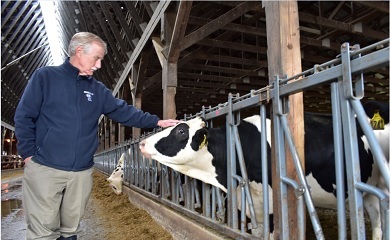
The agriculture community has always been at the heart of Maine’s identity -- no matter where you live, you don't have to drive far to find cows being milked, blueberries being picked, potatoes being harvested, or another one of our state's many incredible agricultural products being put on tables. These small, often family-owned, farms are critical to the success of our economy and are simply part of Maine's identity.
As I'm sure you know, times haven't always been easy for our farmers. With our agricultural industry facing challenges resulting from changing global markets, climate change, and more, we must continue to provide resources and support to these businesses. For this month's episode of Inside Maine, I spoke with a great group of Maine farmers about the opportunities they see and difficulties they're experiencing. You can listen here.
One of the most pressing threats we discussed is the spread of PFAS "forever chemicals" that have prevented some Maine farms from selling their products, and are creating financial burdens for many family farmers.
It's an urgent issue that needs to be addressed, and it's why Maine's Congressional Delegation is leading a bipartisan, bicameral effort to provide urgent assistance to farmers affected by PFAS. Our Relief for Farmers Hit with PFAS Act would authorize grants for states to provide financial assistance to affected farmers, expand monitoring and testing, remediate PFAS, or even help farmers relocate. This is the direct support Maine farmers need.
We also have to make sure that when it comes to selling their products, our farmers are competing on a level playing field. Following the U.S. Food and Drug Administration’s proposed guidance this month allowing nut, oat, soy, and other non-dairy products to continue using "milk” branding, Senator Collins and I joined the bipartisan DAIRY PRIDE Act of 2023 to combat the unfair practice of mislabeling non-dairy products.
Labeling plant-based products as ‘milk’, ‘yogurt’, or ‘cheese’ is misleading to consumers and makes informed dietary choices more difficult. Consumers deserve to clearly see the truth about the food they buy while Maine dairy farmers deserve a fair shot in a crowded marketplace.
These efforts are especially timely as Congress gears up for our "Farm Bill" -- a large package of agriculture related legislation we pass every five years. Hopefully, all these bills can get added in the final package to help Maine farmers.
Some of the other Farm Bill legislation we've been working on this month includes a bill to help farmers manage financial risk through conservation practices, the New Markets for State-Inspected Meat and Poultry Act to allow meat products that pass state inspections to be sold across state lines, and another piece of legislation to make it easier for small farms to sell their locally-produced, meat products to nearby communities. All told, I'm hopeful that we can get these bills done and keep farming at the heart of our Maine identity for years to come.
Good News for Maine Veterans

One of the best, most consistent examples of clear-eyed bipartisan work being done in Congress is in the U.S. Senate Committee on Veteran's Affairs, where I'm proud to join with friends on both sides of the aisle to serve those who fought for our country.
March was a productive month on the Committee -- we held multiple hearings with Veterans' Service Organizations (VSOs) and top administrators at the Veterans Administration (VA) to discuss priorities for this Congressional Session. These included the VA's ongoing workforce challenges, Electronic Health Record Modernization efforts, and increasing affordable long-term care options for older veterans who are trying to age with dignity.
As Maine's servicemembers age, they deserve our continued support to live more autonomously -- it's as simple as that. Hearing this clear feedback from the VSOs, the Senate passed the Elizabeth Dole Home Care Act to significantly expand community-based services for aging veterans. A number of Committee members and I also introduced the bipartisan Expanding Veterans’ Options for Long Term Care Act that would give older veterans – especially those in rural areas – more flexibility to age with dignity using VA benefits.
These bills are important, commonsense efforts that will save taxpayer dollars by reducing nursing home costs, support the success of assisted living facilities like those available at Maine Veterans’ Homes, and build on America’s solemn commitment to our men and women in uniform. Our veterans fought for America’s freedom, the least we can do is support theirs.
It's exciting to be a part of these efforts and to help our men and women who served. I'll keep you posted on these bills -- hopefully we can get them on the President's desk and deliver some more good news for Maine.
Stopping Illegal Drugs from Entering Maine Towns
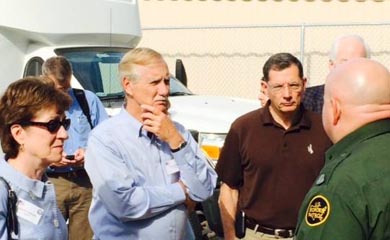
The opioid epidemic is devastating communities across our country. With Maine experiencing a 300% increase in overdose deaths over the past decade –– 716 last year alone – it’s clear every part of our government must take action to address this crisis from every possible angle.
This month, in a hearing of the Senate Armed Services Committee, I asked top Department of Defense (DoD) officials about actions the Department is taking, and resources it is using, to curb the influx of illegal drugs entering our communities. This is an attack on our country -- and they should treat it like one.
It's clear the Department's current strategies are simply not sufficient. I urged them to devote additional Intelligence Surveillance Reconnaissance (ISR) resources to track more drug shipments and stop the devastating substances from ever entering towns across Maine and the country.
Illegal drug shipments aren't the only root of this crisis -- legally authorized opioids have played a huge part in the tragedies felt by so many Maine families. It's why I joined a bipartisan group of my colleagues on the FDA Accountability for Public Safety Act which would strengthen the FDA opioid review process to prevent the approval of dangerous, and inappropriately addictive opioids from being authorized or ever being prescribed to consumers.
There is no one solution to the epidemic, but through improved drug approval oversight, expanded accountability at the FDA, and increased ISR at our borders, I hope we can prevent more needless deaths.
Understanding our Adversaries
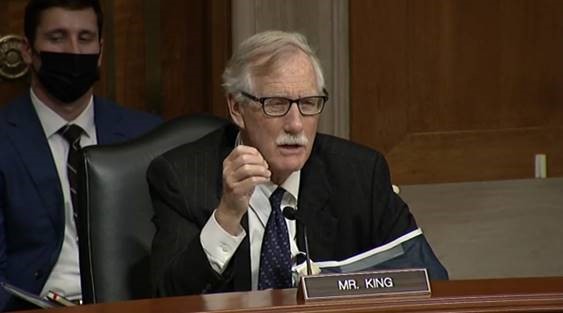
At almost every turn, the United States is facing new challenges on the world stage. Between Russia's invasion of Ukraine and an increasingly aggressive China, America's success over the next decade depends upon our ability to adapt to shifting dynamics, deter widespread global conflicts, and maintain our position as leader of the Free World.
I'm concerned that right now we simply don't have a unified approach to this new era of competition -- that we could end up in a conflict with China not because we want one, but because we didn't fully understand their motivations or how they would react to a challenging situation.
It's why this month, I introduced a bipartisan bill to create a 'China Grand Strategy Commission' that would bring together the smartest public and private sector minds to evaluate our competition with China. This commission won’t just put a report on a shelf to collect dust; it will develop actionable recommendations and a strategy across the entire government to avoid unnecessary escalation while fully defending a rules-based international order.
The need for this comprehensive strategy becomes more and more clear daily. This month alone, I heard from top intelligence and defense officials about how China is expanding their military efforts in space, using "debt colonialism" in Africa, and attempting to control global supply chains.
There is too much at stake to face this challenge without taking into account the current geopolitical landscape, the history and culture of China, and the current trajectory of its leadership. We simply cannot afford a China policy that we make up as we go along, lacking long-term vision and coherence. I hope we can create this bipartisan commission to protect our nation's safety and prosperity for years to come.
Protecting Maine's Lobster Industry

Maine’s lobstermen and women have long demonstrated their commitment to maintaining and protecting a sustainable fishery in the Gulf of Maine. This month, I had the pleasure of speaking with attendees at Maine's Fishermen Forum to discuss the upcoming challenges and opportunities for the fishery with other members of the Maine Congressional Delegation.
One of the challenges I heard about from folks was the barrage of unfounded attacks on the Maine lobster fishery and the uncertainty it has brought to the industry. Lobstermen can't invest in traps or gear if they don't know what the future holds for them -- and that trickles down to suppliers, processors, and everyone in between who relies on lobstering.
Ending this uncertainty was the driving philosophy behind the six-year regulatory pause Maine's Congressional Delegation secured in the FY2023 government funding bill. This provision allows the Maine lobster fishery to continue operating while we collect data and better understand ways to reduce risks to right whales. Without it, Maine’s iconic industry would be facing a complete shutdown—and the ripple effects across our state would have been widespread.
This six-year pause will give our industry time to do what it does best: adapt and innovate. Over the last several years, lobstermen have invested in countless precautionary measures to protect marine life, including removing more than 30,000 miles of line from the water and switching to weaker rope to prevent entanglements. The retailers I met at the forum are building on this work and are truly changing the game when it comes to providing the latest gear for sustainable fishing.
With these exciting new innovations and the legendary work ethic of our lobstermen, the forum left me hopeful for the future of the industry, and gave me a bunch of great ideas to take back to Washington.
Keeping Heritage Industries Strong

I know I say it a lot, but there is truly no state like Maine. We have a shared history that is woven throughout our communities, and proud traditions that are passed down from generation to generation. From lobstering and logging, our heritage industries have long epitomized the Maine way of life.
For centuries, the logging industry has been foundational for our state and rural areas – creating good jobs, supporting working families, and providing essential economic activity. As Maine moves into the 21st Century, it’s imperative we continue our support of the logging industry and help a new generation access the fulfilling, good-paying jobs.
We need to encourage young Mainers to explore careers in logging and provide them with opportunities to join the field in a safe, managed way. That’s why Congressman Golden and I introduced the Future Logging Careers Act this month, with the rest of the Maine Congressional Delegation’s support. The bipartisan bill would give Maine youth the option to jumpstart their career by logging with their parents or grandparents while in high school. It’s a commonsense effort to get more people into the industry and provide good job opportunities.
This will be an important step to protect Maine’s logging future, but it’s only one piece of the puzzle. The logging industry can only be as successful as our forests. If we want to give our children and grandchildren the option to continue logging, we need to ensure that our forests are healthy enough to continue producing world-class products.
That starts with information and data; it’s critical that we get a better understanding of how a changing climate will impact Maine forests and the industry. Earlier this month, Senator Roger Wicker from Mississippi – another proud logging state – and I introduced a bill to establish an industry-led “Future of Forests” panel that can produce comprehensive recommendations to address climate change, support forest health, and bolster sustainable wood production.
There’s a lot to be done, but I’m hopeful Congress will pass both bipartisan bills to support the work our loggers do and help secure Maine’s proud forest heritage.
Meeting Good Folks and Seeing Exciting Investments
One of my favorite parts of my job is traveling the state and meeting with all the good people who are working to make Maine an even better place to live. I've always found that one day of seeing is worth at least a hundred of reading, and this month, in York and Somerset counties, that was certainly the case.
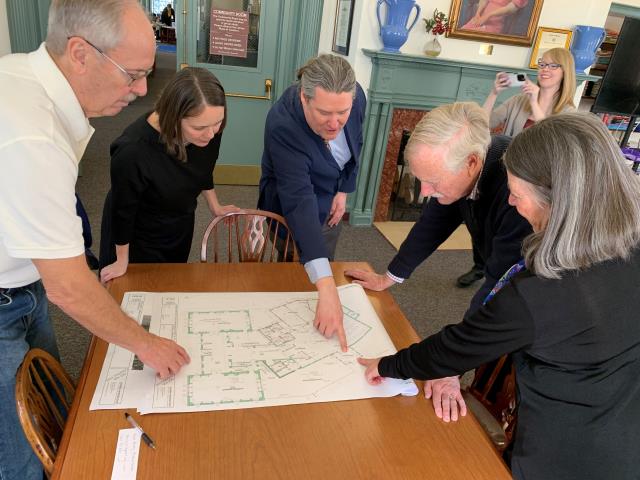
My first stop of the month was in Sanford where I saw the latest developments to renovate and expand the Louis B. Goodall Memorial Library. The project will add a community room, study room, and an office for the Literacy Volunteers of Greater Sanford. Libraries are a vital asset for so many communities and I'm excited to see how these upgrades will support folks in the Sanford area.
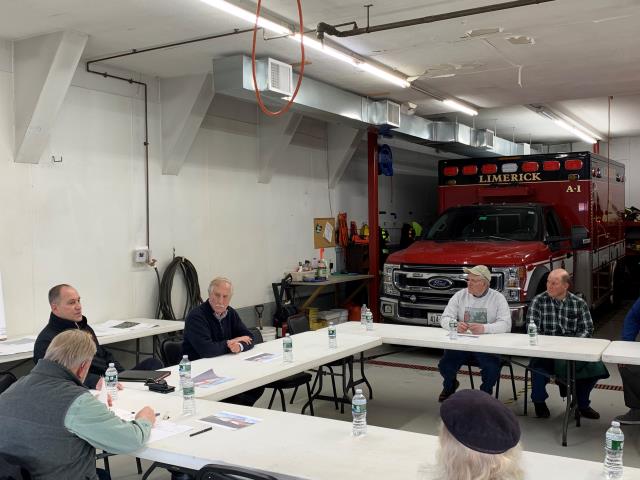
Later in the day, I visited Limerick to hear about the effort of our first responders and see firsthand the new fire and EMS station being built. The station will ensure that rural Maine communities will continue to receive rapid fire response and modern emergency medical services well into the future.
Both the fire station and the library upgrades were the result of Congressionally Directed Spending (CDS). The program was authorized in 2021 on a bipartisan basis, and provides a specific amount of discretionary funding to a state, locality, or nonprofit organization for projects with demonstrable civic and community value.
More information on CDS projects we secured for Maine can be found here.
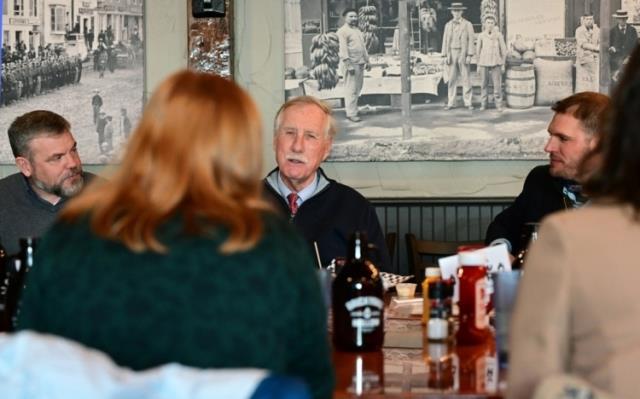
Then, last week, I went west to meet with folks in Somerset County and visit several projects that are slated to invest $650 million into the regional economy.
With tours at the former Madison Paper Mill (now home to TimberHP), the Skowhegan River Park, and the former Solon Manufacturing Co. mill (which is now being transformed into a brewery), I was thoroughly impressed by the new generation of local leaders who are committed to the revival and regrowth of their community.
Each stop was a great learning experience and a powerful reminder of why our state's future is bright. With caring, committed communities like ours, there's nothing we can't accomplish together.
Navigating Cyberthreats on the Seas
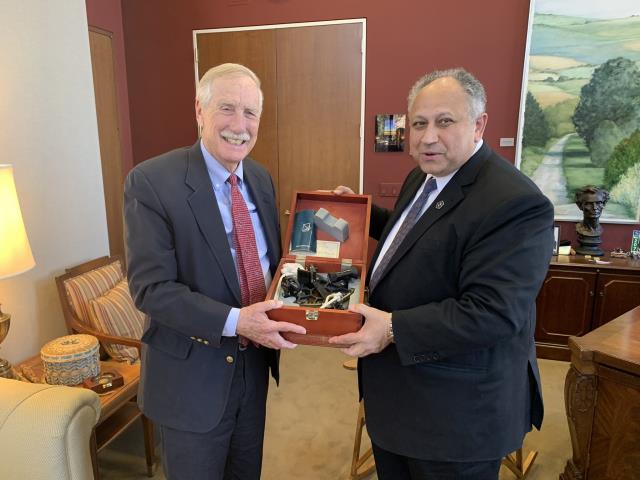
It’s an all-too-possible scenario: our Naval vessels are on the sea, when a cyberattack cuts their connection to navigational technology. Several weeks ago, I urged a top general to ensure our Armed Forces are still trained in star navigation in case their GPS systems go down. During a meeting to discuss shipbuilding, the Secretary of the Navy Carlos Del Toro then brought his own personal ‘sextant’—essentially a compass that uses stars to navigate—to our meeting this month. I am glad the Pentagon understands the gravity of teaching back-up methods to protect our servicemembers in the line of duty. Even in the 21st century, the old school ways can still get the job done.
March Policy Update
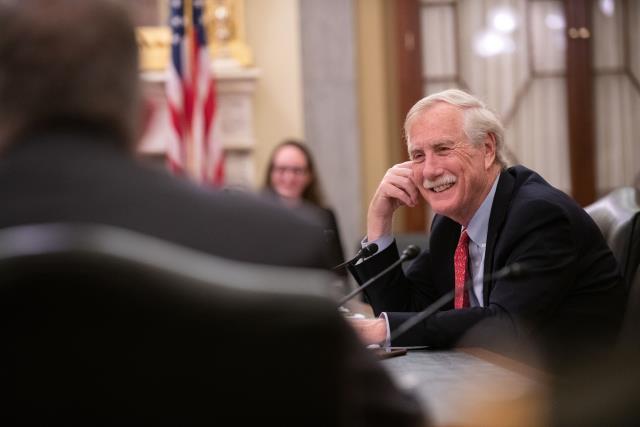
As a reminder, you can read more on my regularly updated press release page at king.senate.gov. Here are some other priorities I’ve been working on.
- Applauding “Comprehensive” National Cybersecurity Strategy. As co-chairs of the Cyberspace Solarium Commission (CSC), Representative Mike Gallagher (R-Wisc.) and I applauded the new National Cybersecurity Strategy. Read more HERE.
- Introducing the Bipartisan, Bicameral COAST Act to Protect Maine Coastline from Offshore Drilling. I introduced a bipartisan, bicameral bill which would permanently prohibit the U.S. Department of Interior from issuing leases for the exploration, development, or production of oil and gas in the North Atlantic, Mid-Atlantic, South Atlantic, and Straits of Florida Planning Areas of the U.S. Outer Continental Shelf. Read more HERE.
- Cosponsoring a Bipartisan Bill to Protect Local Radio Stations from Undue Financial Burdens. Senator Collins and I introduced the Local Radio Freedom Act (LRFA) to protect small, local radio stations from any new performance fee, tax, royalty, or other charges that create financial difficulties. Read more HERE.
- Pressing the USDA to Safeguard Affordable Rural Housing Amid Ongoing Crisis. Following troubling reports that affordable housing complexes in Maine may lose federal protections, Congresswoman Pingree and I are urging the U.S. Department of Agriculture (USDA) to take action that will safeguard critical housing. Read more HERE.
- Leading a Bipartisan Effort to Protect Maine’s Small Businesses from Doubling of Guest Worker Fees. I led a bipartisan group urging the Department of Homeland Security (DHS) and the U.S. Citizenship and Immigration Services (USCIS) to reconsider plans to more than double the fees businesses pay for H-2A and H-2B non-immigrant work visas. Read more HERE.
- Leading Bipartisan Push for Easier, Electronic Access to Duck Permits. I joined members of the Congressional Sportsmen’s Caucus to introduce The Duck Stamp Modernization Act of 2023 which would make the Federal Duck Stamp – required for duck hunting – available electronically. Read more HERE.
In The News
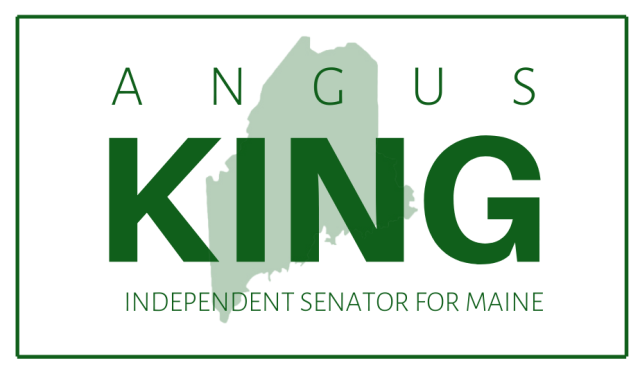
Thanks for subscribing to my monthly newsletter! I would love to hear your ideas for how we can make Maine and our country a better place. Please feel free to reach out with any questions, comments, or concerns by visiting: https://www.king.senate.gov/contact –we look forward to hearing from you.
All the best!

To unsubscribe to this e-Newsletter click HERE.
|